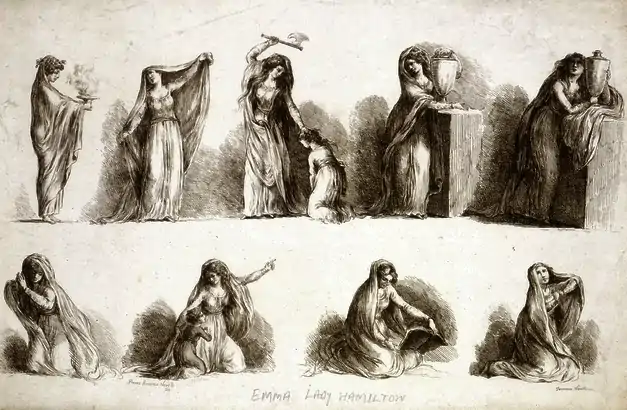Mimoplastic art
Mimoplastic art (also known as attitudes) is a performance art genre depicting works of art by use of mime, especially gestures and draping. Mimoplastic "attitude" is differentiated from the tableau vivant by its imitation of classical sculpture.[1] The genre depicted works of art, particularly classical subjects.[2]

History
It was popularized by Emma, Lady Hamilton.[3] Hamilton's art form may have developed after modelling for the painter, George Romney. Goethe wrote in 1787, "with a few shawls (she) gives so much variety to her poses, gestures, expressions etc., that the spectator can hardly believe his eyes... This much is certain: as a performance it is like nothing you ever saw before in your life".[4] The art form trended among upperclass European women between 1770 and 1815. They created mimoplastic art in their homes.[5] Ida Brun's attitudes included background music and narratives.[6] The literary scholar Henning Fenger (1921-1985), stated that Brun's "mimoplastic art captivated Europe".[7] Other notable performers included Henriette Hendel-Schütz[8] and the only male performer of attitudes, Gustav Anton von Seckendorff.
See also
References
- Richter, Simon J. (1 August 2004). Goethe Yearbook 12. Camden House. pp. 310–. ISBN 978-1-57113-295-6.
- "Attitude and Shawl Dance". The International Encyclopedia of Dance. Oxford Reference. Retrieved 27 April 2014.
- Pulham, Patricia (2008). Art and the Transitional Object in Vernon Lee's Supernatural Tales. Ashgate Publishing, Ltd. pp. 70–. ISBN 978-0-7546-5096-6.
- Hatfield, Jackie; Littman, Stephen (2006). Experimental Film and Video: An Anthology. John Libbey Pub. pp. 102–. ISBN 978-0-86196-664-6.
- Crochunis, Thomas C. (24 February 2004). Joanna Baillie, Romantic Dramatist: Critical Essays. Routledge. pp. 212–. ISBN 978-1-134-42248-7.
- Preston, Carrie J. (5 September 2011). Modernism's Mythic Pose: Gender, Genre, Solo Performance. Oxford University Press. pp. 264–. ISBN 978-0-19-976626-0.
- Fenger, Henning (1971). Twayne's world authors series. Twayne Publishers. p. 54.
- Carlson, Marvin (16 December 2013). Performance: A Critical Introduction. Routledge. pp. 91–. ISBN 978-1-136-49865-7.